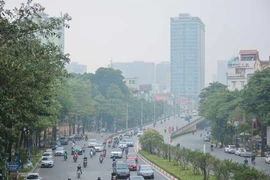Hanoi (VNA) - According to a report by Alive & Thrive, a global nutrition initiative to save lives, prevent illness, and ensure healthy growth of mothers and children, over 800,000 Vietnamese newborns each year have mothers who are not entitled to maternity benefits.
This is primarily due to the fact that a great number of female laborers in Vietnam now work in the informal sector that is outside maternity policy. As such, these mothers have to return to work early to make ends meet. It creates a vicious circle. If the mother stays home, she cannot earn enough to live, yet on the other hand, if they are back to work too soon, they cannot breastfeed their children. In either scenario, their kids face the serious risk of malnutrition.
Vietnam has the highest rate of working women with 70% women aging 15 to 64 joining the labor force. As they return to work after having children, they have to stop breastfeeding their babies.
Therefore, Alive & Thrive and SUN Civil Society Network Vietnam (SUN CSA Vietnam) suggest the government extend maternity policy to all female laborers and create a woman-friendly work environment.
For its part, the Vietnamese government has approved the extension of maternity polices, including the Viet Nam Labour Code 2019 which specifies the length of maternity leave as six months and the Law of Advertising that prohibits alternative products to mother’s milk.
It has resulted in an increase in proportion of children breastfed in the first six months from 19% to 45% from 2010 to 2020.
 The government is asked to extend maternity policy to all female laborers and create a woman-friendly working environment. (Photo: Vietnam+)
The government is asked to extend maternity policy to all female laborers and create a woman-friendly working environment. (Photo: Vietnam+) Still, according to the National Nutrition Census 2019-2020, the rate of babies getting breastfeeding at the age of 12 to 23 months is small at 26% in 2020.
Despite progresses in Vietnam’s maternity policies, a major obstacle still remains. That is the policy’s scope, which only covers 36% of total female labors with compulsory social security. The remaining 64% in informal sectors with voluntary social security, meanwhile, do not fully benefit from the policy.
Vu Hoang Duong, Chairwoman of SUN CSA Vietnam said though the draft Law of Social Securities has shown some progress on providing a maternity pension worth two million VND for those with voluntary social security. However, she also noted that the pension remains low. She proposed the rate to be increased to 3.6 million to 7 million VND per baby.
Women working in the formal sector, despite being covered by maternity policy, still encounter difficulties in ensuring baby’s nutrition. Therefore, their work places are required to comply with regulations on providing mothers with a lactation room at work.
Roger Mathisen, Director of Alive & Thrive Asia-Pacific voiced that a lactation room is among major components of a woman-friendly working environment./.





























